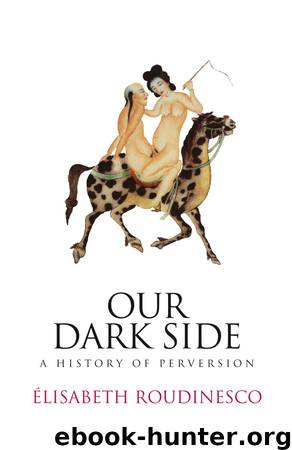Our Dark Side by Roudinesco Elisabeth

Author:Roudinesco, Elisabeth
Language: eng
Format: epub
Publisher: Wiley
Published: 2013-07-25T16:00:00+00:00
That is why Arendt took the view that the actions of such a criminal defied justice and that it was absurd to punish someone who had committed such monstrous crimes by executing him. And besides, that is precisely what Eichmann wanted: to be hanged in public and to enjoy his own execution so that he could believe himself to be immortal and the equal of a god. At the foot of the gibbet, he defied his judges, telling them ‘we shall meet again’ and forgot that it was his own funeral: ‘It was as though in those last minutes he was summing up the lesson that this long course in human wickedness has taught him – the lesson of the fearsome, word-and-thought defying banality of evil’ (Arendt 1984: 252).
It is, then, because he was so extremely normal that Eichmann was the embodiment of perversion at its most abject: a delight in evil, a lack of emotion, automatic gestures, implacable logic, meticulous attention to even minor details and an incredible ability to take responsibility for the most odious crimes by dramatizing them so as to demonstrate how Nazism had turned him into a monster. He was telling the truth when he claimed to have lived by Kant's moral principles (Arendt 1984 [1963]: 135) because, according to Arendt, the wickedness of his orders was nothing in comparison to the imperative force of the order itself. And so he became genocidal without feeling the slightest guilt.
In a preface written for Justine in 1961, Lacan picks up the thesis of Adorno and Horkheimer and dismisses both Sade and Kant without pronouncing in favour of either of them. He was doubtless familiar with the pages Foucault had just devoted to the ‘divine marquis’ in his History of Madness: ‘After Goya and Sade, and since them, unreason belongs to all that is most decisive in any oeuvre: anything that the oeuvre contains which is murderous or constraining’ (Foucault 2006: 535).
Lacan is wrong to argue that Sade did not anticipate Freud, ‘if nothing else, as a catalogue of the perversions’ (2006: 645), but he is right to see Sade's works as the starting point for ‘the insinuating rise in the nineteenth century of the theme of “delight in evil”.’ Sade is, for Lacan, the author of ‘a new theorization of perversion’, and his work is ‘the first step of a subversion’ of which Kant as the ‘turning point’. According to this interpretation, evil, in the Sadean sense, is an equivalent to Kant's ‘good’. Both authors enunciate the principle of the subject's subordination to the Law. According to Lacan, however, Sade introduces the Other in the person of the tormentor and reveals the object of desire (petit a), whereas, for Kant, the destruction of desire is reflected in the moral law, and it reveals the object by outlining a theory of how the Law makes the subject autonomous. Sade's discourse stresses the imperative ‘Thou shalt come’ – and desire remains subject to the law because it is a voluntary instrument of human freedom’.
Download
This site does not store any files on its server. We only index and link to content provided by other sites. Please contact the content providers to delete copyright contents if any and email us, we'll remove relevant links or contents immediately.
Rewire Your Anxious Brain by Catherine M. Pittman(18654)
Talking to Strangers by Malcolm Gladwell(13370)
The Art of Thinking Clearly by Rolf Dobelli(10489)
Mindhunter: Inside the FBI's Elite Serial Crime Unit by John E. Douglas & Mark Olshaker(9343)
Becoming Supernatural by Dr. Joe Dispenza(8217)
Change Your Questions, Change Your Life by Marilee Adams(7783)
Nudge - Improving Decisions about Health, Wealth, and Happiness by Thaler Sunstein(7707)
The Road Less Traveled by M. Scott Peck(7603)
The Lost Art of Listening by Michael P. Nichols(7506)
Mastermind: How to Think Like Sherlock Holmes by Maria Konnikova(7347)
Enlightenment Now: The Case for Reason, Science, Humanism, and Progress by Steven Pinker(7313)
Win Bigly by Scott Adams(7198)
The Way of Zen by Alan W. Watts(6614)
Daring Greatly by Brene Brown(6514)
Big Magic: Creative Living Beyond Fear by Elizabeth Gilbert(5772)
Grit by Angela Duckworth(5615)
Ego Is the Enemy by Ryan Holiday(5450)
Men In Love by Nancy Friday(5240)
The Laws of Human Nature by Robert Greene(5208)
